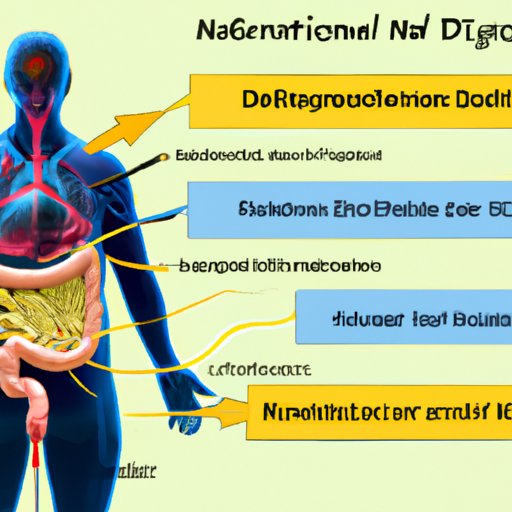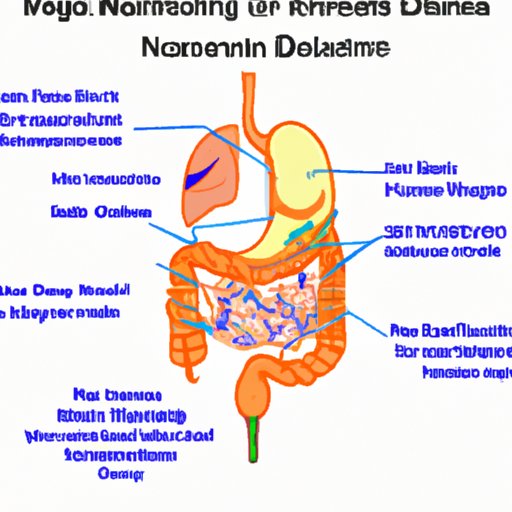Introduction
The human body is a complex and intricate system that works together in harmony to keep us healthy and functioning. The digestive and nervous systems are two key components of this system, and they are interconnected in many ways. In this article, we will explore how the digestive system works with the nervous system and examine the role of the nervous system in regulating digestion.

Examining the Role of the Nervous System in Regulating Digestion
The nervous system plays a vital role in controlling and regulating the digestive process. It does this by sending electrical and chemical signals to the digestive organs. These signals can be either excitatory, which means they stimulate the digestive organs to increase their activity, or inhibitory, meaning they suppress the activity of the digestive organs.
The signals sent by the nervous system can be divided into two categories: autonomic and somatic. Autonomic signals are those sent without conscious effort, while somatic signals are those that require conscious effort, such as when you choose to swallow or chew food. Both types of signals are important for the proper functioning of the digestive system.
The autonomic nervous system is responsible for controlling the involuntary movements of the digestive organs, such as peristalsis and secretion of digestive juices. It also regulates the movement of food through the digestive tract and the absorption of nutrients from the food.
The somatic nervous system is responsible for controlling voluntary movements, such as chewing and swallowing. It also plays an important role in controlling the tone of the muscles in the digestive tract and in activating the digestive glands.

How the Digestive System Uses Signals From the Nervous System
The digestive system utilizes signals from the nervous system in a variety of ways. For example, the signals sent by the nervous system can trigger the release of digestive enzymes and hormones, which are essential for the breakdown and absorption of nutrients. The signals can also cause the walls of the stomach and intestines to contract or relax, which helps move food through the digestive tract.
In addition, the nervous system can send signals that affect the production of gastric acid, which helps to break down food. The signals can also influence the rate at which food is moved through the digestive tract, as well as its passage into the bloodstream.
Finally, the nervous system can send signals that affect the muscles of the digestive tract, causing them to contract or relax. This can help regulate the passage of food through the digestive tract, as well as the absorption of nutrients from the food.
How Does Stress Affect Digestion and the Nervous System?
Stress can have a significant impact on both the digestive and nervous systems. When a person is under stress, the body releases hormones that can interfere with the normal functioning of the digestive system. This can lead to indigestion, bloating, constipation, diarrhea, and other digestive issues.
Stress can also interfere with the signals sent by the nervous system to the digestive organs. When this happens, the digestive organs may not receive the signals they need to function properly, leading to digestive problems.
Understanding the Relationship Between the Digestive and Nervous Systems
It is important to understand the relationship between the digestive and nervous systems in order to maintain optimal health. Understanding how the two systems interact can help you better manage stress and make lifestyle changes that promote digestive health.
For example, learning relaxation techniques, such as deep breathing and meditation, can help to reduce stress and improve digestion. Eating a balanced diet and exercising regularly can also help to improve digestion and reduce the effects of stress on the digestive system.
In addition, understanding the connection between the digestive and nervous systems can help you recognize when something is wrong with your digestive system. If you experience digestive issues, such as constipation, bloating, or nausea, it could be a sign that there is an imbalance in your digestive system and/or nervous system.
Conclusion
The digestive and nervous systems are intimately connected and play an important role in maintaining overall health. The nervous system sends signals to control digestion, while the digestive system uses these signals to regulate its processes. Additionally, stress can affect both the digestive and nervous systems, so it is important to understand the relationship between the two in order to manage stress and promote digestive health.
By understanding the interconnectedness of the digestive and nervous systems, you can better manage stress and make lifestyle changes that promote digestive health. This can help you stay healthy and prevent digestive issues.
(Note: Is this article not meeting your expectations? Do you have knowledge or insights to share? Unlock new opportunities and expand your reach by joining our authors team. Click Registration to join us and share your expertise with our readers.)
